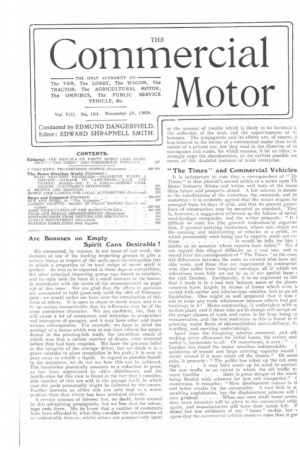"The Times" and Commercial Vehicles
Page 1

If you've noticed an error in this article please click here to report it so we can fix it.
It is satisfactory to note that a correspondent of " Th Times," in that journal's second article of a series upon Th Motor Industry thinks and writes well both of the iMlrif diate future and prospects ahead. A full column is devote to the sub-divisions of the motorbus, the motorcab, and th motorvan : it is evidently agreed that the steam wagon ha emerged from its days of trial, and that its present genert: lines of construction may be accepted as standard. Ther is, however, a suggestive reference to the failure of certai road-haulage companies, and the writer proceeds : "It i difficult to meet his (the general tradesman's) argumer that, if general carrying businesses, whose solo object wa the running and maintaining of vehicles at a profit, an which presumably were being run by experts, could not cot tintte it would be folly for him I dabble as an amateur where experts have failed." We d not regard this alleged difficulty as a real one, and w would refer the correspondent of a The Times" to the esser tial differences between the costs to owners who have sui able work, and those that are experienced by contractor who also suffer from irregular earnings, all of which cot siderations were fully set out by us in our special issue < the isth October. Incidentally, it is no argument to inf< that a trade is in a bad way because some of the pione4 concerns have, largely by reason of losses which were it curred with earlier and inferior-type vehicles, had to go lot liquidation. One might as well propound that it was r use to enter any trade whatsoever because others had gor bankrupt in it ! Motor contracting, if undertaken with tit to-date plant, and if those who are in charge will accept on the proper classes of work and rates, is far from 'being um remunerative, and the best testimony to this is found in ti growing motor fleets of old-established parcel-delivery, fo warding, and carrying undertakings.
Apart from the foregoing adverse comment, and aft making every allowance for initial losses, the review und notice is favourable to all. Of motorbuses, it says : London has found the motor omnibus indispensable. 1 quickness of transit and large carrying capacity would I sorely missed if it were taken off the streets." Of moto cabs, it proceeds : "The public has taken up the cab ama ingly . . . it may have made up its mind to patroni. the new traffic to an extent to which the old traffic w: never familiar . . . there is great danger of the mark being flooded with schemes for new cab companies." ( motorvans, it remarks : " Slow development means in tl end better results for the community. A vast field is st awaiting exploitation, but the displacement process will 1 very gradual. . . . When our next trade boom arrive then more attention will be given to the commercial vehic again, and manufacturers will have their hands full. V detect but few evidences of any " boom " to-day, but c agree that the commercial vehicle deserves more than it gel




















